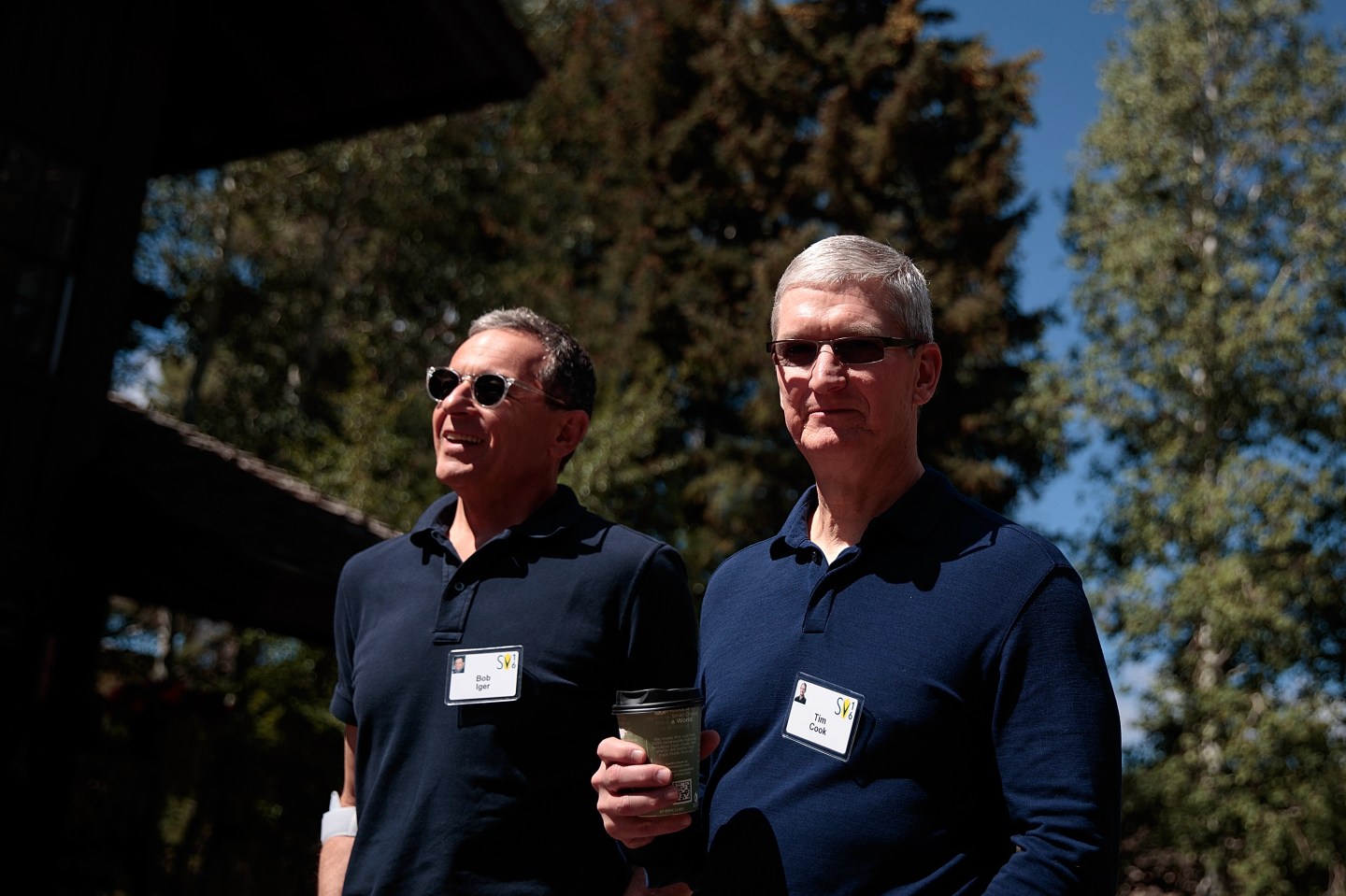If Bob Iger wanted to quash repeated rumors the Disney CEO plans to sell the business to Apple, he might not want to bring the subject up all on his own.
Asked by Time magazine who he looked to for inspiration following his triumphant return in November, the 72-year-old didn’t hesitate and immediately cited the tech giant’s legendary cofounder.
“The person that I think most of, that I was fortunate enough to have observed very closely is Steve Jobs,” Iger replied in an interview. “Speaking with him when I did, and reflecting on what his experiences were–I’ve taken a lot from that.”
Named to Time’s “100 Most Influential People in the World” list after fewer than five months back on the job, Iger has been hard at work restructuring the Mouse House after it came under siege from investors.
Like Jobs, who in 1997 returned to helm Apple after a 12-year-long interregnum, Iger is once more running his former company after Disney drifted off course under his successor, Bob Chapek.
Iger is now in the process of slashing $5.5 billion in costs and eliminating 7,000 jobs after its core content production division swung to an operating loss of $10 million in the fiscal first quarter that ended in December, mainly due to costs related to Disney+, its direct-to-consumer streaming business.
Only his theme parks division is currently profitable.
That’s why rumors are making the rounds that Iger may have been brought back to sell the iconic company to Apple, one of the very few with deep enough pockets to possibly afford such a deal.
Would Apple buy Disney?
— Jon Erlichman (@JonErlichman) April 2, 2023
On Wall Street this week, that subject received some fresh attention.
Here’s more on the story… 🧵 pic.twitter.com/krKjELpFRX
Disney’s equity costs roughly $180 billion alone, and adding a 20% control premium common to takeovers would raise the price tag up to well over $200 billion.
Apple, the world’s largest company with a market value of $2.6 trillion, could easily raise that kind of money.
The speculation is not entirely out of left field. Iger himself had already admitted it was on his mind four years ago when he published his autobiography.
“I believe that if Steve were still alive, we would have combined our companies, or at least discussed the possibility very seriously,” Iger wrote in The Ride of a Lifetime: Lessons From 15 Years as CEO of the Walt Disney Company.
Why would Apple buy Disney?
Entertainment is fundamentally shifting away from cinematic releases and linear television like cable to streaming enabled by the latest hardware available in the field of consumer electronics—a field Apple dominates together with rival Samsung.
Typically any debate on the ongoing streaming wars, though, has focused just on those aiming to topple Netflix from its perch atop the business, such as Disney, Paramount, and Warner Bros.
Discovery just unveiled plans last week to fold its various streaming providers like HBO into one giant offer.
By comparison, Apple TV is rarely mentioned in the same breath, despite the critical success of original shows Ted Lasso and The Morning Show.
Its spending is modest at $7 billion this year compared to Disney’s $30 billion, according to estimates from research firm Moffett Nathanson, and its library of free content cannot compete with the big Hollywood studios.
Acquiring Disney would in one fell swoop address that deficiency and give Apple an additional argument for consumers to buy one of its smartphones or tablets over a rival.
A spokesman for Apple could not be reached immediately by Fortune for comment, but Iger’s comments to Time serve to highlight the long history between Jobs and Disney.
This reaches back decades to when the Apple cofounder was busy acquiring and managing a small computer graphics studio called Pixar from Lucasfilm.
After a hugely successful collaboration that began in 1991 with the development of Toy Story and reached its zenith with Finding Nemo, Jobs and Disney went their separate ways in early 2004.
Iger’s first big act after being promoted to CEO in October 2005 was the purchase of Pixar, which valued the studio’s equity at $6.3 billion.
In the process, Jobs as the studio’s cofounder joined the board and became Disney’s largest shareholder with nearly 7% of the stock (his widow, Laurene Powell Jobs, later cut the stake to 4% in January 2017).
The speculation over a possible Apple takeover reached such a level that Iger addressed the issue in his very first town hall as returning CEO without actually giving a definitive yes or no.
“What you’ve read about in that regard is just pure speculation,” he was quoted by Los Angeles Times sources as saying in November.
Nevertheless, the rumor won’t go away in part because a number of analysts find the logic of the deal too convincing to be ignored.













